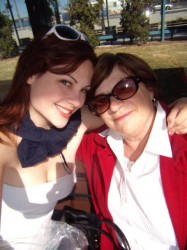 When I was very young, my mother’s hands were as white as porcelain, as smooth as silk, with each long slender finger tipped with fire engine red. I loved their beauty and inherent strength, their ability to dwarf my own, and the fine cursive handwriting and pencil sketches they could do.
When I was very young, my mother’s hands were as white as porcelain, as smooth as silk, with each long slender finger tipped with fire engine red. I loved their beauty and inherent strength, their ability to dwarf my own, and the fine cursive handwriting and pencil sketches they could do.
They looked nothing like my own hands. Mine were tiny and insignificant, always dirty from playing in the garden and scratched from climbing trees. I wanted mine to be more like hers. I wanted to be more like her. I admired her for her courage, her beauty, and most of all for her strength. I thought she could handle anything.
Except when she couldn’t. There comes a time in everyone’s life when you realise your parents are fallible, that they’re human, that they’re not indestructible. It stands out in your memory like a beacon. A point where you realise, however distantly, your parents’ mortality. And your own.
For me, it was when my mother stopped getting out of bed. I was around eight years old, and she was forty-seven. Some days were better than others, but many days were the same. She was sad a lot, and in pain. Her joints became swollen and it became difficult for her to walk. She cried in the bathroom, using the faucet to muffle the sound of her sobs, and painted on a smile on her face whenever I was around.
Her hands transformed from the strong and beautiful hands I knew so well into aliens. Her knuckles swelled up and her fingers curled inwards, as if trying to escape from themselves. She stopped painting her nails. She stopped sketching.
Her hands were still beautiful, but in a fragile way, like ancient paper or antique china. I was afraid to touch them, afraid of hurting her.
She answered my incessant questions as well as she could. It was something called rheumatoid arthritis, and no, it didn’t hurt, and yes, she was fine.
As young as I was, I knew better.
Over the years drugs slowed the progression of the disease, although they came with terrible side effects. They suppressed her immune system, so she caught every cold and flu going around. She put on weight. She was tired, and sick, and never had an appetite.
To me, her hands were no longer beautiful. Fluid pooled in the joints, and each knuckle bone was white and swollen. Her bones were twisted and gnarled like an ancient oak trunk, covered with skin spots from the drugs, angular and frightening and somehow alien and separate from who she was.
I was still afraid to touch them, but if I were honest with myself I would have admitted that it wasn’t because I was afraid of hurting her, but of hurting myself. I wanted to separate myself from these things that were weak and frightening.
I knew my mother was strong and beautiful despite her hands, but I still couldn’t bring myself to hold them.
I was still young, twenty-two, when I was diagnosed. I left it for as long as I could before going to the doctor. Convincing myself the swelling and the aching was from working too much, or the cold, or the onset of the flu, I told myself it was nothing.
I knew better.
It started in my right knee. Soon enough it spread to the other one, a searing, hot, jarring pain unlike anything I’d ever felt before. I was very tired, and never hungry, and by the time it reached my hands, I could barely walk.
Eventually, I told my mother. I told her I was fine, and that it didn’t hurt. I think I wanted to appear strong. I didn’t want her to worry.
She was quiet for a long time. Her eyes did all the talking, filling the space between us. Eventually, she asked me if I was really okay.
I meant to say I was, but the words couldn’t come out. Instead I told her that it hurt. That I was scared I would never be able to run again, or dance, and would one day no longer be able to write. Writing was, and is, my world. The thought of losing the use of my hands terrified me.
“It hurts, mom,” I said again, quietly.
“It sure does,” she replied. She looked at me with her hazel green eyes, so calm, and took one of my hands in hers. I didn’t pull away.
In that moment I realized my mom wasn’t strong and beautiful despite her illness, but because of it.
And so was I.
My mother’s hands look nothing like my own. Today, hers are blue veined and wrinkled and asymmetrical. Mine are white porcelain, smooth alabaster silk, nails red-tipped.
The months following my diagnosis were filled with doctor’s appointments, x-rays, powerful pills, prayer, acupuncture and physiotherapy. After six months I went into remission after adopting a vegan diet, and remained in remission for the past five years. I think the diet helps. The prayer can’t hurt, either.
Rarely a day goes by I don’t look at my hands and remember all the things, that for a short time, they couldn’t do. Holding a mug. Using a pen. Dialling someone’s number. Opening a car door. Using a can opener.
At twenty-six, I still climb trees. I dance. I run. I draw, badly. I write, all the time.
I know there may come a time I’ll no longer be able to do any of these things. Of course it makes me sad, and a little mad, and more than a little scared. Yet it also makes me thankful. It makes me appreciate what I can do today.
My mom has had rheumatoid arthritis for almost twenty years. She’s sixty-five now, and she has good days and bad days. She still rarely tells me when she’s struggling, although I can always tell.
She’s still the most beautiful person I’ve ever met.
Recently, she had the finger joints replaced with silicon plastic implants. Her hands no longer cause her pain, and she likes the idea of being part mechanical, something strong and indestructible.
“I’m a bionic woman,” she joked.
I looked at her and smiled. I held her hand.
“Yes. You are.”
Emily Rose Bio:
 Emily Rose is an Australian/Canadian freelance writer and editor living in Vancouver, BC.
Emily Rose is an Australian/Canadian freelance writer and editor living in Vancouver, BC.
Passionate about raising mental health awareness, she has a postgraduate degree in Psychology and has worked as a counsellor and facilitated therapeutic creative writing workshops for individuals with mental illness. Her work has appeared in a number of online and print publications including The Vancouver Observer, The Granville Island website and the anthology Emerge. She is currently writing a narrative non-fiction book about mental illness in North America, called South of Sane: Navigating Madness across North America (www.crazy tales.org). Her fiction, articles and other writings can be found at www.writtenbyrose.com.
Back to Stories

